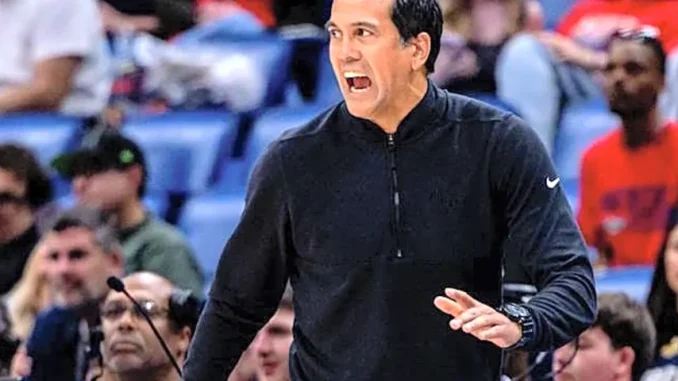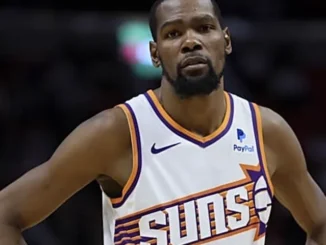
As the regular season winds down and teams gear up for the playoffs, caution typically becomes the name of the game. For contenders, resting starters, preserving health, and minimizing risk take precedence over the marginal gains of one last win. But Erik Spoelstra, ever the tactician and competitor, is taking a different approach — and it’s one that could either sharpen the Miami Heat’s edge or set them ablaze before the playoffs even begin.
The Heat head coach has announced his intention to play his starters in the final regular-season game — a move that, while understandable on the surface, comes with serious risks attached. Miami, as always, is fighting tooth and nail for playoff positioning in a congested Eastern Conference, but with injury histories looming and the postseason just days away, Spoelstra’s decision is a gamble that feels more like playing with fire than making a power move.
The Risk/Reward Equation
Let’s start with the rationale. Miami enters the final game jockeying for seed positioning, potentially moving up to secure home-court advantage in the Play-In Tournament or even sneak into the sixth seed to avoid it altogether. Every win matters. In that sense, Spoelstra’s mindset is consistent with the Heat culture: compete relentlessly, finish strong, never coast.
But there’s a flip side to that coin. Miami has been bruised and battered all season. Jimmy Butler has already dealt with knee soreness and ankle tweaks. Bam Adebayo has logged heavy minutes anchoring both ends of the floor. And Kyle Lowry, though no longer the primary engine, is not exactly the picture of durability at this stage of his career.
Throw in players like Tyler Herro, who’s missed extended time, and suddenly you’re looking at a roster that’s one hard screen or awkward landing away from disaster. Playing them at full tilt in a game that may only marginally improve playoff seeding is akin to pushing your luck at the roulette table. The odds might not be terrible, but the consequences of a loss are far worse than the benefits of a win.
Heat Culture vs. Common Sense
The Heat have long prided themselves on being different — tougher, grittier, more disciplined. That identity is not just a brand; it’s a blueprint that has propelled them deep into the playoffs time and again, even when the odds said otherwise. But there’s a fine line between culture and stubbornness.
Spoelstra is undoubtedly one of the best coaches in the league — a master of game management, adjustments, and team psychology. But even great coaches can fall into the trap of competing for competition’s sake. There’s a reason the top teams rest players heading into the postseason. Momentum matters, yes — but not as much as health.
And while the Heat may thrive on adversity, giving yourself another obstacle — like a star player nursing a fresh injury — isn’t grit. It’s recklessness.
Play-In Roulette
There’s another layer to this: Miami might still end up in the Play-In, even with a win. That tournament is chaos by design — one off night and you’re on the brink of elimination. But losing a key player in the regular-season finale only increases the chances that chaos swallows your season.
Imagine if Butler tweaks a hamstring or Adebayo lands awkwardly on a contested rebound. Suddenly, you’re not just fighting to stay alive — you’re doing it without your leaders. And the Eastern Conference, even beyond the top seeds, is no joke. Teams like the 76ers, Pacers, or even the surging Bulls can capitalize on any vulnerability.
Playing your stars in the final game might seem like a way to control your destiny, but if fate decides otherwise, it could backfire spectacularly.
The Depth Dilemma
One could argue that Spoelstra doesn’t fully trust his bench to get the job done — and to some degree, that’s fair. Miami’s depth has been inconsistent, with younger players like Jaime Jaquez Jr. and Nikola Jović still growing into their roles. But that’s exactly why this finale could have been an opportunity to test them under pressure.
Give your bench the keys and let them fight. If they win, great — the starters are fresher. If they lose, well, at least you didn’t compromise your top guys ahead of the games that really matter.
Besides, Spoelstra has proven time and again he can coach circles around opponents even without a full arsenal. Trusting that track record would have made more sense than squeezing one last drop out of a tired core.
What’s the Endgame?
In the end, the Heat may come out of the finale unscathed, grab the seed they want, and ride into the playoffs with a full head of steam. If that happens, Spoelstra will look like a genius who stayed aggressive when others went passive.
But if even one player goes down, the narrative shifts entirely. It becomes a story of stubbornness, of pushing when pulling back would have been wiser.
And that’s the tightrope Spoelstra is walking.
Final Thoughts
There’s no question Erik Spoelstra wants to win — that’s never been in doubt. But winning the war sometimes means conceding a battle, especially when that battle holds limited strategic value. Playing his starters in the regular-season finale feels like a statement move, but the smarter play might have been the quieter one.
Spoelstra may be a master chess player, but in this case, he’s moving his queen into traffic with a playoff run on the line. Heat fans can only hope it doesn’t end in checkmate.
Let me know if you’d like this tailored for publication, or adapted into a shorter opinion column or social media thread!


Be the first to comment